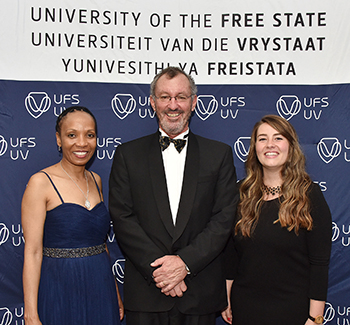
Justice Mahube Molemela, Justice Ian van der Merwe
and Tanya Calitz.
The annual Chancellor’s Distinguished Alumni Awards ceremony was presented by the Office of Institutional Advancement on 5 November 2016, at the University of the Free State (UFS) Bloemfontein Campus. The prestigious awards recognise outstanding achievements of UFS alumni provincially, nationally and internationally. These are alumni who have not only placed the university on the world stage but have inspired the next generation of Kovsies and their communities at large.
“I am proud of this year’s award recipients and it is an honour to recognise them for the contributions they make,” said Justice Ian van der Merwe, Chairperson of the UFS Council, at the ceremony. “With these awards, the university wants to strengthen its bond and replenish its connection with alumni, showcase their achievements, and inspire other alumni and students to achieve in their respective fields,” Justice van der Merwe said.
For the first time, the Young Alumnus of the Year Award was presented, to recognise and celebrate the achievements of alumni who have graduated within the past decade. The recipient of the award, Tanya Calitz, Research Lawyer at the Constitutional Court of South Africa, said in her acceptance speech: “At Kovsies you arrive as a student and leave as a critical thinker and leader.”
The Chancellor’s Distinguished Alumnus Award was presented to Justice Mahube Molemela, Chancellor of the Central University of Technology and Judge President of the Free State High Court. “I accept this award with humility and appreciation from this esteemed institution. It is moments like these that we as alumni should reflect on what we can do to contribute to the excellence of the UFS,” said Justice Molemela.
More awards were presented to alumni in the following categories:
• Rolene Strauss, former Miss World and student at the UFS.
• Wayde van Niekerk, current world record holder, world champion and Olympic champion in the 400 metres, and student at the UFS.
Cum Laude Award:
• Neil Powell, Coach of Blitzbokke that won the bronze medal at the Olympic Games in 2016.
• Professor Eunice Seekoe, Acting Dean: Faculty of Health Sciences, and leader in Health Science professional training.
• Gary Stroebel, CEO of Central Media Group and visionary media pioneer.
Executive Management Award:
• Anna Botha (Tannie Ans), coach and mentor of Wayde van Niekerk.
• Anton Esterhuyse, musical director, composer, arranger, producer, and performer.